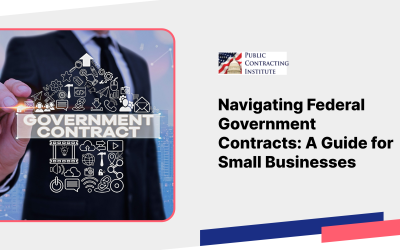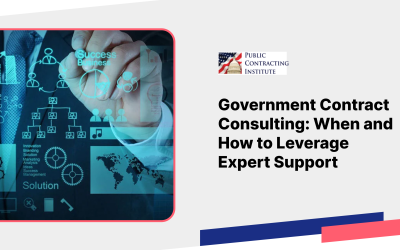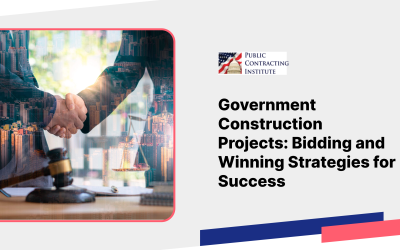The Government Accountability Office (“GAO”) has recently confirmed that in a reverse auction conducted on behalf of an agency by FedBid (recently renamed “Unison Marketplace”), Fedbid serves as the government’s agent, and must comply with procedural requirements in the Federal Acquisition Regulation (“FAR”) or lose a protest. BCW Group, LLC, B-417209 et al., March 27, 2019. In a “reverse auction,” the bidder that agrees to meet the technical and delivery requirements (and in most cases, the past performance requirements) and offers the lowest price receives the award.
Facts – FedBid Served as Government’s Agent
In this procurement, the Department of the Interior issued a solicitation for brand name or equal interactive screens with touch technology, plus once maintenance. The procurement was to be held through the FedBid reverse auction technique. At the close of bidding, BCW’s bid of $149,156 was the lowest bid submitted, and BCW checked a box on the FedBid website that stated “the vendor complies with all terms listed by the Buyer”—which was the Department of the Interior. However, BCW did not specifically restate that its bid included maintenance.
Following the close of the auction, FedBid sent a “validation request” by email to BCW which asked if BCW’s bid price was correct and “inclusive of all costs the Buyer [Interior] would incur if BCW’s bid is selected.” BCW responded by email and stated that the price was correct and included maintenance as required by the solicitation.
Six days after the auction, the agency opened the five bids submitted. Two weeks later, the award was made to ODIN at a price of $179,669, despite BCW’s lower price. The agency stated that BCW agreed to comply with “all terms” but did not specifically restate that BCW would provide maintenance. FedBid never notified the agency that it issued a validation request to BCW, or that BCW had responded and confirmed that its bid included maintenance.
Holding – Government fairness requirements still apply when a commercial entity has been deputized.
GAO noted that when FedBid hosts a reverse auction it acts as an agent for the agency conducting the procurement. Specifically, FedBid is conducting the procurement on behalf of the agency. And since the government, through its agent, FedBid, chose to request information from BCW on whether it was offering maintenance, the agency was required to consider that information in evaluating the bids that were received. (Note that FAR 1.102-2(c) requires that agencies conduct business with integrity, fairness and openness.)
Even though the contracting officer stated that he did not know that FedBid sent out a validation request, there was no dispute that the agency authorized FedBid to act on the agency’s behalf. Since BCW complied with FedBid’s request and verified that its bid included maintenance, and BCW was the lowest bidder, the GAO held that the agency was required to consider that information before making award. The protest was sustained.
Takeaway – Commercial Entities and Government Fairness Requirements
When agencies deputize commercial entities (like FedBed) to conduct a procurement, the actions of those entities must comply with the FAR and with the fairness requirements for government procurement. Interior did not do so in this procurement.
For other helpful suggestions on government contracting, visit:
Richard D. Lieberman’s FAR Consulting at https://www.richarddlieberman.com/, and Mistakes in Government Contracting at https://richarddlieberman.wixsite.com/mistakes
The Public Contracting Institute is dedicated to high-quality government contracts training, and offers popular classes like FUN with the FAR, May the Clause Be with You, and DFUN with the DFARS. Join us today, or give us a call (202-775-7240) or email (ophelia@publiccontractinginstitute.com) to schedule a customized training tailored to your organizations unique needs. We also have unique offerings like the eLearning subscription and the recording trainings subscription. Join PCI for a high-quality training today!
If you’d like to learn more about Bid Protests, consider joining us for this free program on Bid Protests:
Everything you Need to Know About Bid Protests
All Sessions 2:00-3:30pm ET
In today’s increasingly competitive federal market, protests – including bid, and size/status – are an inevitable feature of many procurements. Succeeding in the federal marketplace requires an understanding of these processes, and how to navigate them. In this series, McCarter & English Government Contracts Partners Maria Panichelli and Franklin Turner will provide attendees with an overview on the different types of protests that a government contractor can file, or have filed against it. In this series, contractors will learn the differences between bid, size, and status protests, and how to use each to challenge contract awards that were improperly made to competitors. Attendees will also learn how to defend against unmeritorious protests filed against their own contract awards.
Feb 1, 2024: Effective Use of Debriefings and Bid Protests
Feb 8, 2024: Keeping Your Award: Bid Protest Intervention
Feb 15, 2024: Size and Status Protests: A Primer on Bases, Process and Procedure
If you are interested in case law generally, join PCI for Case of the Month Club 2024
Case of the Month 2024
Second Tuesday of the Month, 12:00-1:00pm ET
Please join our Case of the Month Club, a program in which our expert instructors will take a deep dive into recent decisions involving issues that affect all of us on a regular basis. This class, meant for contracting professionals, will focus on different cases, going beyond the mere holding into the history, tactics, and significance of the case as a whole. Whether the cases are bid protests or contract claims, our instructors, all of whom are experienced professionals, will discuss the facts of the cases at hand, the reasons why the cases are important, the strategies that were used, and the lessons that can be learned from them. To maximize your experience, we will send you copies of the cases in advance so that you are primed for the discussion when our program begins. Sound interesting? We hope so, and we look forward to having you with us for the start of the series.




